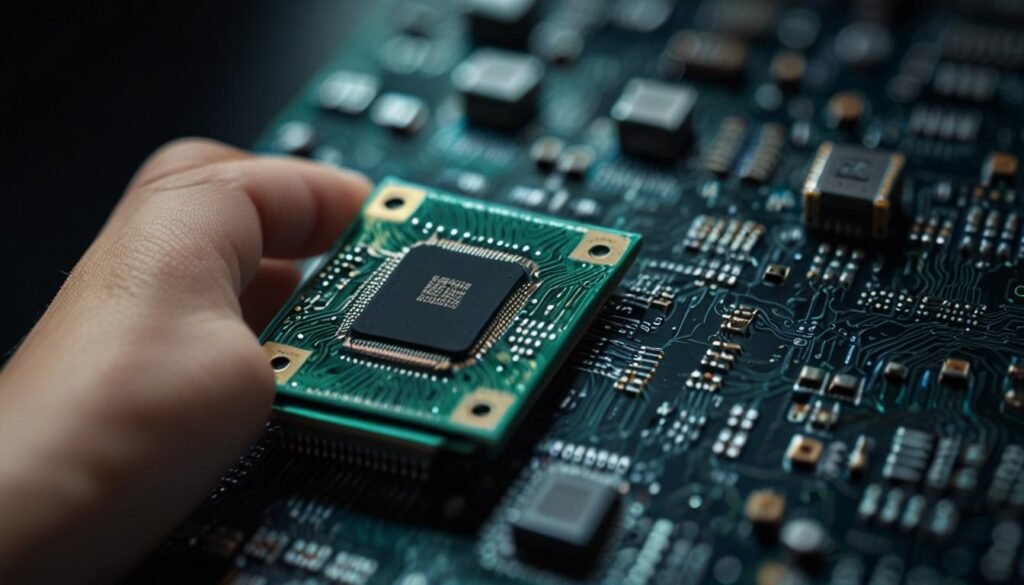Concerns grow over a possible global semiconductor shortage driven by surging demand for AI technologies, with varying expert opinions on potential impacts across industries.
Potential Global Semiconductor Shortage as AI Demand Surges
The burgeoning artificial intelligence (AI) revolution is sparking concerns about a forthcoming global semiconductor shortage. Diverse expert opinions highlight the varying potential impacts on supply chains, consumer markets and technological innovation.
A report from Bain and Company underscores the increasing demand for AI-focused chips driven by a surge in the production of AI-enabled devices. The situation brings to mind recent semiconductor shortages which affected multiple industries, from automotive to consumer electronics, underscoring AI’s significant growing influence on global commerce.
Key Industry Perspectives
Robert Khachatryan, CEO of Freight Right Global Logistics, indicates that an AI-induced chip shortage “could significantly impact the availability and pricing of AI-enabled electronics, disrupt supply chains in AI-reliant industries and slow innovation in AI products, ultimately affecting global commerce.”
The current market conditions support this concern. In 2023, advanced AI chips commanding approximately $40,000 each saw robust demand, with over a million units in circulation. Market projection estimates suggest AI chip valuation could balloon, potentially adding $85-95 billion annually by 2025.
Labhesh Patet, co-founder and CEO of the AI company Autonomys, provided a similar outlook, noting that increased semiconductor demand, ongoing supply chain disruptions and geopolitical tensions, such as U.S. restrictions on China’s access to advanced chips, are likely to drive up production costs for AI-powered devices.
However, some industry experts are less alarmist about an imminent shortage. Antanas Laurutis, CEO of Altechna, believes the threat is not immediately pressing. “We shouldn’t expect a big effect on the pricing and availability of electronics. The demand for AI-enabled electronics is simply not big enough yet, and it has been decreasing since COVID-19,” Laurutis commented.
Industry Impact and Market Dynamics
The potential semiconductor shortage poses a significant risk to sectors such as eCommerce, which relies heavily on advanced AI models. These models analyse user data like browsing patterns and purchase history to tailor shopping experiences, maintaining high levels of customer satisfaction and operational efficiency.
A shortage in semiconductors might impede companies’ capabilities to upgrade or sustain their current AI systems, leading to slower response times and reduced customer satisfaction.
Potential mitigating factors could counterbalance these risks. For instance, the CHIPS Act and efforts to repatriate chip manufacturing to the U.S. could lessen the influence of Chinese supply constraints. “We believe that by the time the surge of demand and this shortage happens, it will already be produced free from China influence,” Laurutis pointed out.
The Innovation Perspective
Opinions vary on the possible slowdown of AI innovation due to a prolonged chip shortage. Building new manufacturing facilities entails time, potentially delaying the development and deployment of AI technologies. This concern is especially resonant given the experiences from the 2020-2023 global chip shortage.
A prolonged shortage could have significant consequences across industries reliant on AI, such as eCommerce, manufacturing, and logistics. The complexity of obtaining essential chips could stall the development of new AI tools, disrupt business operations, and challenge companies’ agility, possibly affecting global markets.
However, not all perspectives foresee a dire scenario. Laurutis suggests that market forces could self-correct any emerging shortages. “Overall, the market dictates the demand; it self-regulates. And when technological maturity and real market demand are reached, capital will ensure that the shortage doesn’t last too long and doesn’t slow down innovation.”
As the AI revolution advances, the global semiconductor industry finds itself at a pivotal juncture, balancing unprecedented demand with resilient supply mechanisms. The extent and timing of an AI-induced chip shortage remain points of debate, but the industry continues to watch closely, preparing for various outcomes.
Source: Noah Wire Services
















